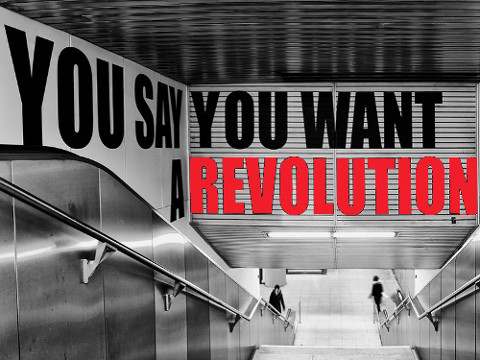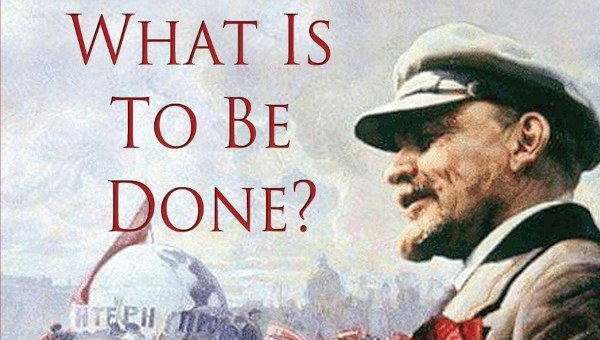Socialism and Accountability
History teaches us nothing, so said Social Democratic Party (SPD) leader Andrea Nahles, to justify discontinuing the SPD’s Historical Commission. Long ago, Rosa Luxemburg took the opposite position: “history is the only true teacher” (GW 4: 480). Perhaps history really doesn’t teach us how we should act immediately in our current situation. This is true in general, and also in very specific circumstances. Were we not convinced that the tradition of critical fascist analysis would give us the concepts to resist developments in capitalist society that tend toward an erosion of democracy, toward authoritarian and exceptional state forms which drastically worsen the prospects of emancipation? Didn’t we believe that, equipped with this knowledge, with all our “historical interrogations,” we would be better able to resist and defeat right-wing forces? It appears not to be the case.

But history teaches us something much more fundamental, namely that our present moment is the present of a history. In this present, the struggles and the missed opportunities of the past are condensed in a special way. It is not a question of “what might have been,” but of concrete decisions, of victories and defeats, of real alternatives. It also teaches us that once decisions have been made, they actually result in long-term developments.
Our Present is Embedded in a Specific History
The different attempts made to realize socialism, many of which proved to be wrong or senseless, which failed or were defeated, are all a part of our present’s history. Because of these previous attempts, many things associated with the name socialism are now considered historically obsolete, out-dated, or discredited. There are several reasons why this is the case. Socialism was associated with practices that contradicted and discredited socialism’s emancipatory ambitions. In many cases it is doubtful that those who acted and spoke in the name of socialist objectives were pursuing anything more than the selfish interests of individual functionaries.
Yet it would be a false consolation to think that an idea that was good in itself was merely abused. Indeed, the ideas and concepts of socialism are the subject of discussion and conflict. Understood in this way, there is no definition of socialism which is valid a priori; rather there are a range of suggestions for how to define it. In many cases, the term encompassed particular social groups who (for a time rightly) believed that they embodied the general will, but who did not understand that the concept of socialism in whose name they were acting was a compromise that enjoyed the support of many people only due to the circumstances prevailing at that moment. They wanted to cling to this moment and this claim to universality, and enforce stability. Unable to adapt to the changes in the social constellation, they denounced different ways of life, perspectives, or contradictions as deviations, or pathologized their critics. In this way, socialism was not an open, free, social organization of collective life, but rather remained limited to certain social groups and their life situations (certain groups of industrial workers, special modes of production, for example large industrial factories in urban regions, and related forms of work organization), which claimed to be universal.
According to this claim, socialism is the only social form through which contradictions are consciously lived and worked out. This is why Karl Korsch was able to say that socialist society needs to be more skilled at processing contradictions, or in other words, that socialism is actually more complex than the capitalist form of social organization. This is because it no longer denies the contradictions and consigns them to anonymous social processes, such as the conflict between consumers and producers over products and product quantities, over working hours or shares in the overall productive output, or over ecological consequences. In this context, Marx’s unique contribution to the socialist tradition was to take the objective existence of contradictions seriously, to articulate and analyse them, but without moralizing, sugar-coating, or erasing them through the state’s claims to universality, or to suppress them by administrative means.
If there are differences and contradictions between the claims to universality and the various social groups, their interests, and needs, then there is a need for forms which can mediate contradictions and tensions between the universal and the particular. Democracy is the process through which this happens. It is a regulated process in which individuals debate about what can be considered universal in a specific situation. Negotiations about universal interests impact the direction in which society as a whole develops. This can involve all aspects of society, including its products, its work processes, educational and qualification processes, forms of housing and town planning, nutrition, and gendered and familial divisions of labour.
Whether due to a lack of effort or other reasons, state socialisms failed to democratically regulate these processes of reconciling universal interests with the diverse interests of particular groups. Although the socialist states saw themselves as democratic people’s republics, hardly any democratic processes of mediating between different interest groups were initiated. Though they often held onto the political form of parliaments and parties, the internal logic of these forms was blocked in order to maintain the Communist or Socialist parties’ monopoly on power, so that universal interests were not defined through open discussion, but rather by the most powerful working-class party. The workers did not make decisions on matters that affected them. There were no experiments with other forms of democratic coordination (such as those discussed throughout the history of the socialist movement) which would have enabled the workers and the members of society to participate in defining claims to universality.
The bourgeois class can allow its internal differences to find expression by distributing power among several competing parties and political institutions. The left has so far contributed little to the development of a conception of the limitation of political power, or what Michel Foucault called a socialist art of government or governmentality. This is certainly one aspect that has contributed to its defeat. For when it comes to gathering together many different groups and interests under one concept of universality, then it is also necessary that all those involved are able to remove themselves from this alliance without being subjected to negative consequences. They must be able to anticipate this and expect to be able to present a modified, perhaps even different concept of the universal.
No Capitalism Without Socialism
It is a very curious thing when people say that socialism has been discredited. Socialism occupies one of the deepest layers of modern society itself. A modern society based on capitalist methods of production would not exist without socialism. This society cannot be separated into an objective reality on the one side and different ideologies and political tendencies on the other, which would include not only liberalism and conservatism but also socialism, which, after it has destroyed its reputation, can then simply be cast aside. Even if there may have been socialisms before modern socialism – just as there was class rule and the appropriation of the surplus product by those who did not produce it – it was only constituted in modern capitalist society through a series of disputes. It is an aspect of the real movement of this society, not a value or norm that might be added externally to a given reality. Socialism is the name given to those internal tendencies in capitalist society that are necessary to solve the large problems of social development.
These large problems are historically new in this form, because humanity only comes to observe and understand itself as a collective actor under capitalism. People can analyse the exploitation of nature and the disturbance of the Earth’s metabolism. For example, they know all about fish numbers, oil reserves, the extent of rainforests or whale populations. They are able to understand that economic crises that lead to unemployment, hunger, or migration are not due to unexpected natural processes like a bad harvest, but are caused by humanity itself; they understand that inequality is the result of disparities in education and skills. Humanity is aware of genocides, the global trafficking of human beings, the approximate number of slaves and sexual violence. Each of these major problems calls for concrete solutions: not merely for incremental improvements here and there, but for the problems in each case individually to be “surpassed.” We need to reach a point where we no longer need to search for solutions, because the problems have simply become superfluous, since they ultimately no longer occur.
No Liberation Without Overcoming Wage Labour
Why lump all these efforts together under one single name, the name of “socialism”? For historical reasons – so as not to obstruct access to all the experiences and attempts made at emancipation; so as not to remain naive in the face of all the decisions that have led to the present and which have all contributed to making life better and worse at the same time. But also because socialism refers to a specific moment in modern history. It is the keystone of the whole that holds everything together, since it is constitutively at the beginning of the constellation of the modern, capitalist way of life: wage labour, which makes it possible to produce the historically unique form of social wealth in a specific way – money, commodities, means of production, company shares, assets, real estate.
The wage form is the social form which makes it possible to reproduce all other forms of exploitation and domination. It is impossible to change capitalist relations without also changing these forms; in other words, without overcoming wage labour, which refers to the fact that human labour-power is a commodity that must be moulded for the labour market and must strive to find someone who has a need for this commodity at market prices. This entails all the risks for individuals, including being left without work and income, earning too little, or ruining our own ability to work and being unable to actually enjoy our lives.
If socialism appears to be discredited today, then we must count this as a defeat. In light of this, the question arises as to why anyone is happy that this is the case. Because the failure of socialism means the failure of the project of the Enlightenment itself. Understood in this way, it is a matter of people finding the courage to free themselves from their self-inflicted immaturity, that is, from conditions that they create through their own actions and that confront them again and again with the same problems at ever higher levels. Everything progresses except the whole is how Theodor Adorno describes this circumstance. In fact, there is something malicious to criticisms of socialism, since they often misjudge socialism’s historical significance.
One of socialism’s decisive characteristics is its claim to rationality. The contradictions that permeate society can be openly expressed and, by consciously addressing them, can be avoided, overcome, or transformed into differences and otherness. On the basis of this claim to rationality, all mistakes, all contradictions, all dysfunctions that arise during a transformation of the way of life of a society can be attributed to socialism. Yet this transformation is confronted with extreme forms of nonsynchronism: with regards to people’s level of knowledge and education, their needs, regional developments, the state of production and services, ecological destruction, as well as the production of new, rational cycles of production and consumption. The temporal horizon of socialist transformation is more expansive than that of capitalist processes: this applies both to the past and to the distant future.
The socialist project bears responsibility and must be held accountable for what it tried and what failed in its name. The same does not apply to capitalism. Admittedly, social criticism (particularly that of a left-wing and socialist stripe) attempts to attribute many of our society’s problems to capitalism. But these efforts struggle to gain traction; and this is not because there are a host of intellectuals fighting against such an attribution, who work to prevent the formation of such an “empty signifier” in which violence, wars, and genocides, the destruction of human lives, exploitation, ecological catastrophes, the sexist and racist denigration of human beings is symbolically condensed into the ultimate, morally debased antagonist. Rather the defenders of capitalism point to the complexity of our society, which makes it difficult to attribute these social evils to any one cause.
Nobody seems responsible for the melting of the glaciers and polar ice caps, or if they are, we all are. When it comes to explaining the causes, everything seems to dissolve into a plethora of details: fossil fuels and related industries, agriculture, the automobile industry, container ships, and cruise liners. It all seems fragmented, unplanned, random, uncoordinated – the trans-intentional result of many different chains of action for which there is no primary cause. Anyone who tries to identify causes and protagonists, however, is portrayed as lacking nuance or even influenced by conspiracy theories. But the processes are internally interlinked, coordinated, complement each other, and form a constellation. Yet the capitalist reproduction process appears to be an anonymous systemic process for which everyone and no one, and perhaps even the majority – the subalterns – bear responsibility.

In the socialist tradition, Marx managed to address this perspective most seriously. Despite the fact that via liberal ideas of equality and freedom, of autonomy and the will to justice, a moral criticism of owners of capital is quite plausible and had often been proposed, Marx emphasized that it was mistaken to attempt to morally reproach individual entrepreneurs, capital owners, or politicians. For it is precisely the immorality of social processes that provides the impetus for demanding a transformation of the overall context that is consciously shaped by all. With his remarks, Marx was also able to make it clear that anonymity is not so anonymous after all, since different degrees of freedom already exist in bourgeois, capitalist society.
The bourgeois class is far more capable of determining capitalist relations, of maintaining itself as a social group amidst these relations which it is always reshaping, and of maintaining and changing the relations in its favour than is possible for people who do not possess capital and do not have access to bourgeois consensus-building events such as the World Economic Forum, who are not able to determine public opinion through their media and their cultural industry, who are not included in political decision-making processes, but who are above all objects of administration and useful instruments for the enrichment of fewer and fewer. It is a characteristic of developed modern domination that the wealth of the rich and the power of the powerful appear to be the incidental result of the implementation of practical necessities that supposedly serve the good of all. Only complex conceptual abstractions and statistical studies shed light on the systematic relationships.
Failure: One Moment in a Process of Change
Is it even possible for socialism to be defeated and to fail? In her final text, written after the January uprising in 1919 and shortly before her assassination, Rosa Luxemburg answers this question in the negative. The whole path of socialism will be littered with defeats, writes Luxemburg (GS 4: 536f). It is necessary to reflect further on this claim. Strangely enough, for Luxemburg it is not a tragic circumstance, where an unrelenting logic necessarily leads to a hopeless situation. The course of history is driven by its negative side. Defeat is everything that does not contribute to a change in conditions in the sense of a change in the mode of production.
Accordingly, victory is by no means the triumphant victory in a battle, as is sometimes imagined, but the process of implementing a free organization of cooperation, the elements of which are always already present. In this respect, a historical failure is always a moment in an ongoing evolution of understanding and of shaping social relations. This enables the freedom of others, an increase in individualization, where the free development of each person is enabled by the freedom of all, thus creating a dynamic of a continual evolution of freedom, rather than the kind of zero-sum game of freedom that liberalism imagines, under which the freedom of one person can only come at the expense of other people. Such a socialist idea of freedom is only conceivable on the basis of cooperation. For only in cooperation – that is, under conditions of a sophisticated division of labour – can individuals achieve more and greater things than would ever be possible by themselves alone. •
This article first published on the Rosa-Luxemburg-Stiftung website.





